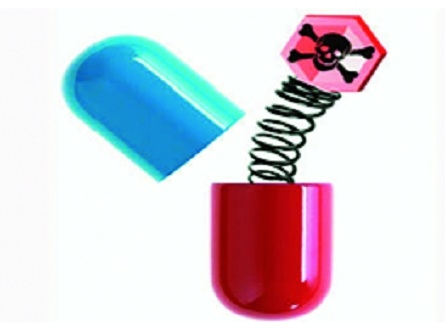Sale of spurious drugs increased during pandemic
| Date :24-Jun-2021 |

By Rajendra Diwe :
A report says, “Substandard, Spurious, Falsely Labelled, Falsified, and Counterfeit (SSFFC) incidents increased by 20% between 2018 to 2020 and 17% between 2019 to 2020. Incidents reported in these sectors constitute over 84% of total counterfeits”
The covid-19 pandemic has triggered an increase of substandard, spurious, falsely labelled, falsified, and counterfeit (SSFFC) incidents in pharmaceuticals and medical devices, says a report published by Pharmabiz. According to e-pharmail of Pharmabiz, “Global enforcement agencies including Interpol have noticed an increase of substandard, spurious, falsely labelled, falsified, and counterfeit (SSFFC) incidents in pharmaceuticals and medical devices. The Covid-19 pandemic has triggered such frauds due to the unprecedented demand for medicines.” Quoting Nakul Pasricha, President of Authentication Solution Providers’ Association (ASPA), the report mentioned, “It has been observed that criminals are taking advantage of the high demand for medicines, health supplements, hygiene products and other essentials.
The fraudsters have contaminated the market by selling fake and sub-standard products threatening the lives medical professionals and patients. In India, pharmaceuticals are among the top five categories at high risk of counterfeiting after alcohol, tobacco, FMCG packaged goods and currency. “Counterfeit incidents increased by 20% between 2018 to 2020 and 17% between 2019 to 2020. Incidents reported in these sectors constitute over 84 percent of total counterfeits,” the report said. “Government needs to ensure that consumers are not duped with counterfeit medicines and medical devices. We “Government needs to ensure that consumers are not duped with counterfeit medicines and medical devices.
We recommend that government should create awareness on counterfeits. Law enforcement personnel must be empowered and trained to be alert and crackdown on those selling fake products. Further, genuine manufacturers of pharmaceuticals in high demand should be incentivised to reduce scarcity and keep counterfeiters at bay,” ASPA president added. In the area of counterfeits, India continues to be on the ‘Priority Watch List’ of the United States Trade Representative (USTR) for the lack of adequate Intellectual Property Rights protection and enforcement, according to Annual Special 301 Report of USTR. Others include Algeria, Argentina, Chile, China, Indonesia, Russia, Saudi Arabia, Ukraine and Venezuela. It is estimated that counterfeit costs the Indian economy over Rs 1 trillion annually. It is also becoming difficult to detect such frauds because counterfeiters are becoming smarter as technology is used to reproduce packaging.
These duplicate packs are almost identical to the original which only a trained and diligent eye can detect. Considerable attention is needed to spot package tampering signs. However we do see that a bit of care and diligence would make a huge difference, Pasricha told Pharmabiz. The Drug and Cosmetics Act mandates surveillance of SSFFCs as a joint responsibility of the Central and the State drugs control departments. Even consumers can observant about spurious or sub-standard pharmaceuticals and report to drug regulators. Technology including smartphones can check via internet to determine the products authenticity. Phygital authentication solutions: holograms, QR codes, unique identification numbers on bar-codes are cost-effective and make it extremely easy to detect spurious products and report fraudulence.
Further tech-integrated authentication effectively track and trace the point of pilferage in the supply chain. Combination of physical and digital technologies, he said. In order to build and nurture a robust authentication ecosystem, ASPA has put in place awareness drives and advisories for the industry to adopt anti-counterfeiting measures. It has inked an MoU with GS1 India to disseminate information on global standards to detect and control counterfeits. It has a Counterfeit News Repository with India’s counterfeit incidents and will shortly release the first edition of Authentication & Traceability Source Guide. The government needs to ensure authentication practices are enforced for its Make in India initiative as trust is a critical factor as pharmaceuticals that are exported need to be genuine, safe and secure until they are delivered to the end consumer across the globe, said Pasricha.